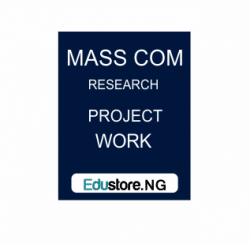CHAPTER ONE
Introduction
1.1 Background of the study
In the post-second World War years, development co-operation was based on transfer of technologies to developing countries. According to the model of social labour division in western cultures, technical knowledge transferred by extension services and utilized by farms (Roth, 2001). The introduction of western technology to non-western farmers was intended to increase production capacity and improve the market position of agriculture.
According to Israel and Wilson (2006), developing an understanding of extension sources and channels used by clients to obtain information is a pre-requisite for efficient educational programming because messages that go unheard or unseen cannot lead to change.
Though early extension effort based on direct communication with clients, changes in society and technology have resulted in programmes using diverse array of communication channels to reach clients, both directly and through surrogates.
Many clients, especially other people continue to rely on more traditional channels for agricultural information while using newer technologies as a complement (Howell and Hebron, 2004, Vergot et al, 2005, Boz and Ozca, 2010).
In a very concise way, development communication is application of the process. In other words, development communication is the use of the principle and practice to exchange ideas in order to fulfill development objectives.
DOWNLOAD COMPLETE WORK
DISCLAIMER:
- For Reference Only: Materials are for research, citation, and idea generation purposes and not for submission as your original final year project work.
- Avoid Plagiarism: Do not copy or submit this content as your own project. Doing so may result in academic consequences.
- Use as a Framework: This complete project research material should guide the development of your own final year project work.
- Academic Access: This platform is designed to reduce the stress of visiting school libraries by providing easy access to research materials.
- Institutional Support: Tertiary institutions encourage the review of previous academic works such as journals and theses.
- Open Education: The site is maintained through paid subscriptions to continue offering open access educational resources.



